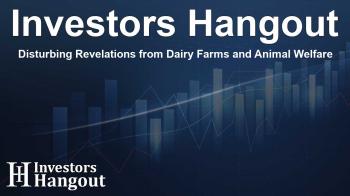Disturbing Revelations from Dairy Farms and Animal Welfare

Uncovering the Dark Side of Dairy Farming
Mercy For Animals recently unveiled alarming hidden-camera footage from a dairy farm where disturbing practices have been documented, raising concerns about animal welfare. This footage reveals that the cruelty faced by animals on these farms is widespread and systematic.
The investigation highlights a dairy farm that harbors over 600,000 cows, part of a vast network supplying milk, cheese, and other dairy products that families across the nation consume. As a result of the heavy demand for dairy products, cows face harsh treatment that is often overlooked by consumers.
Shocking Cruelty and Inhumane Conditions
The footage displays heartbreaking moments, including mother cows crying out for their calves that are taken away shortly after birth. It shows not only the emotional trauma inflicted on these animals but also physical abuse, such as cows being beaten and left in filthy living conditions. The brutality witnessed shines a light on the darker reality of dairy production.
Leah Garcés, CEO and president of Mercy For Animals, expressed her horror at the treatment of these cows, paralleling their suffering to that of any grieving mother. Her compelling message emphasizes that what happens behind closed barn doors is often concealed from public view.
Key Findings from the Dairy Investigation
Several key findings emerged from the Mercy For Animals investigation:
- Separation Trauma: Calves are routinely and forcibly separated from their mothers, which causes immense distress. Many calves are isolated in pens without the care needed from their mothers, experiencing pain from unnecessary procedures such as chemical burns on horn buds to prevent growth.
- Physical Abuse: The footage shows cows being beaten with sticks, kicked, and even dragged by their tails, often when they are injured.
- Neglected Health: Animals on these farms suffer from untreated infections and visible injuries, leading to a high level of distress and pain.
- Unsanitary Conditions: Manure-covered surfaces is a common sight, often causing slips and falls, leading to further injuries for the animals.
Environmental and Health Risks
The investigation also highlights the environmental impact of large-scale dairy farms. Each dairy cow produces an immense amount of waste that significantly contributes to water and air pollution. These facilities have been found operating without the necessary federal permits, raising serious environmental concerns.
Public Health Implications
The ongoing bird flu outbreak, which has affected numerous dairy herds, illustrates the public health risks associated with factory farming. Crowded and unhealthy conditions on these farms not only put animals at risk but also threaten human health, as demonstrated by the increase in infections among farm workers.
Walter Sánchez-Suárez, an expert on animal behavior and welfare, noted that the consequences of dairy production extend far beyond animal suffering, affecting ecosystems and human societies alike.
Industry Accountability and Consumer Choice
Major dairy companies like Leprino Foods and Saputo play a critical role in this disturbing situation. Despite previous investigations revealing similar abuses, these companies have made few improvements. With a significant share of the dairy market, consumers have the power to push for change.
Switching to plant-based alternatives is a feasible action consumers can support to foster a more ethical and sustainable food system. As awareness grows regarding the realities behind dairy production, more consumers may choose these options for their health and ethical implications.
For those interested in viewing the distressing footage captured during the investigation, it is available online through various platforms.
Frequently Asked Questions
What is the significance of the hidden-camera footage?
The footage reveals the harsh realities of dairy farming, including animal cruelty and neglect, challenging the industry's standards and practices.
Why is the separation of calves from mothers cruel?
Separation causes immense emotional trauma to both the mother and the calf, and it neglects the natural bond that exists between them.
What are the environmental impacts of dairy farms?
Dairy farms are major sources of water and air pollution due to the large amounts of waste they produce, affecting local ecosystems and communities.
How does dairy farming affect public health?
The overcrowded and unsanitary conditions in dairy farms can lead to the spread of diseases, posing risks not just to the animals but also to farmworkers and consumers.
What actions can consumers take to promote change?
Consumers can opt for plant-based alternatives, advocate for humane treatment of animals, and support brands committed to ethical practices in the food industry.
About The Author
Contact Thomas Cooper privately here. Or send an email with ATTN: Thomas Cooper as the subject to contact@investorshangout.com.
About Investors Hangout
Investors Hangout is a leading online stock forum for financial discussion and learning, offering a wide range of free tools and resources. It draws in traders of all levels, who exchange market knowledge, investigate trading tactics, and keep an eye on industry developments in real time. Featuring financial articles, stock message boards, quotes, charts, company profiles, and live news updates. Through cooperative learning and a wealth of informational resources, it helps users from novices creating their first portfolios to experts honing their techniques. Join Investors Hangout today: https://investorshangout.com/
The content of this article is based on factual, publicly available information and does not represent legal, financial, or investment advice. Investors Hangout does not offer financial advice, and the author is not a licensed financial advisor. Consult a qualified advisor before making any financial or investment decisions based on this article. This article should not be considered advice to purchase, sell, or hold any securities or other investments. If any of the material provided here is inaccurate, please contact us for corrections.

